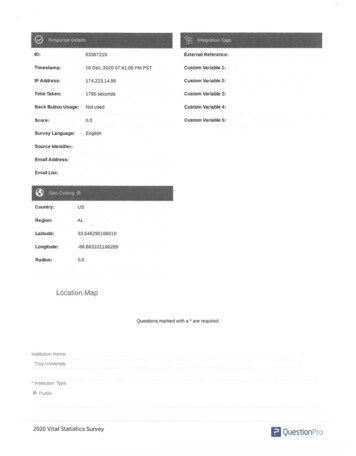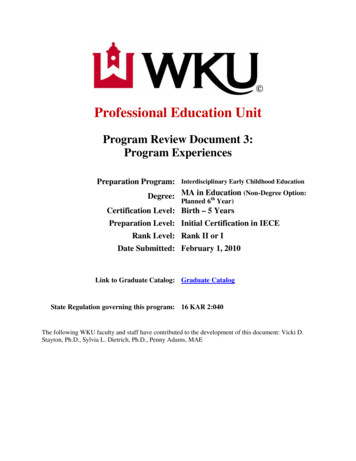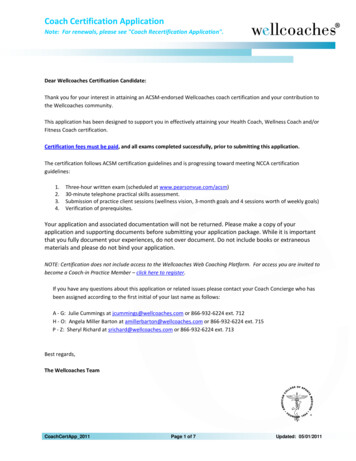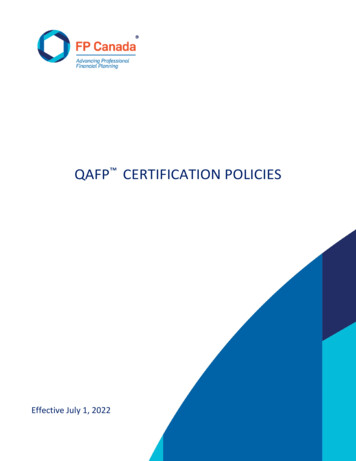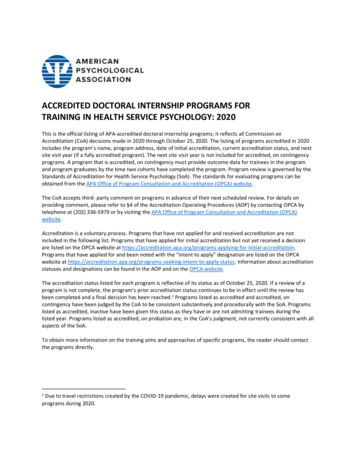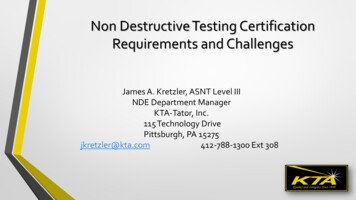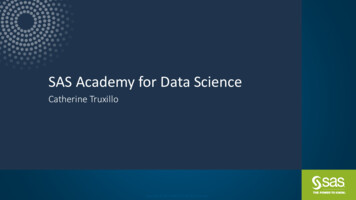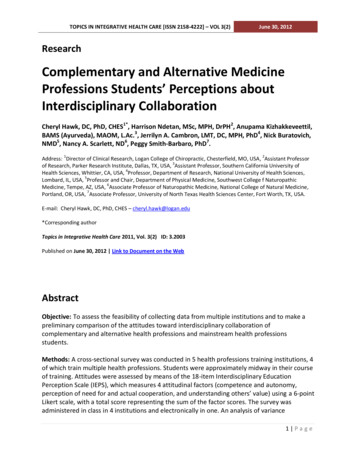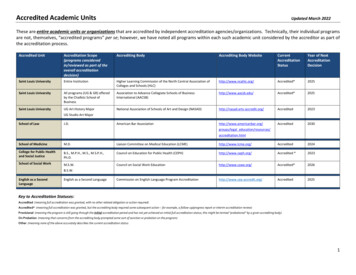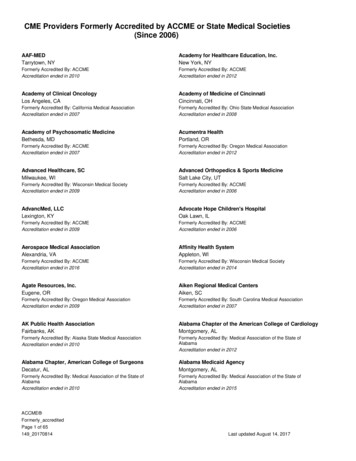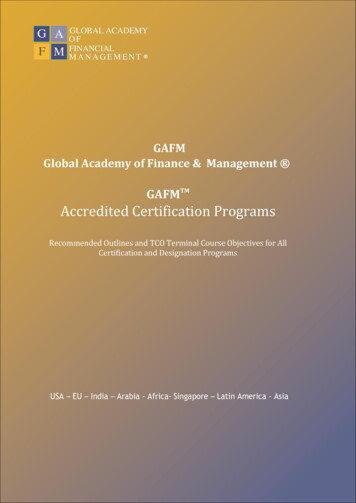
Transcription
G AF MGLOBAL ACADEMYOFFINANCIALMANAGEMENT GAFMGlobal Academy of Finance & Management GAFMTMAccredited Certification ProgramsRecommended Outlines and TCO Terminal Course Objectives for AllCertification and Designation ProgramsUSA – EU – India – Arabia - Africa- Singapore – Latin America - Asia1
About The Academy2Mission Statement 1996-20132Official Recognition3Summary of Other Recognition, Alliances, and AAFM Friends.3AAFMTM Designations List:4Course Outlines5Master Financial Professional (MFP)6AMC Accredited Management Consultant (Quick-MBA)8Chartered Certified Wealth Manager (CWM)10Accredited Management Accountant (AMA)11Certified Risk Analyst (CRA)12Registered Financial Specialist (RFS)14Master Financial Manager (MFM)15Chartered Market Analyst-Financial Analyst Designate (FAD)16Chartered Portfolio Manager (CPM)17Chartered Trust and Estate Planner (CTEP)18Certified Credit Analyst (CCA)19Certified Cash Flow Manager (CCFM)20Financial Assistant (FA)23Accredited Financial Analyst (AFA)24Certified Marketer (CMA)26MMC Master Management Consultant 27Specialist In-House Programs31Advanced Wealth Management Development Program32Alliance Partners33AAFM Notable Alliances33Allied University Program342
About GAFMTMThe GAFM was founded in 1996, via a merger between the Graduate Leadership Institute & Analysts andthe Institute for Professional Analysts. The Leadership Institute was originally established as a professionalorganization for management consultants, professors, and analysts. The Institute was founded to examinestrategic accounting, risk, and finance issues. GAFM currently recognizes over 20,000 PhDs, Lawyers, CPAs,Business School Graduates, & Masters Degree Holders as executive members in over 151 nations. GAFMtakes pride in holding a membership with superior qualifications, experience, and designations.GAFM is the regulatory body for the much sought after GAFM Designations and Credentials. The GAFMExecutive Designation Programs provides the assurance that the holder has met the suggested criteria forgraduate credentials set out in the Ibanez US Supreme Court Decision. Further, the GAFM boardcertification requires passing 6 different levels of standards. Acceptance into the GAFM is a high distinctionand requires the holder to possess a graduate level portfolio of skills and knowledge. Acceptance statisticsare not high, and the designation when achieved is a high honor strictly for accredited degree graduates.The GAFM has seen a meteoric rise to affluence and membership in recent years, as financial executives andmanagers strive to maintain and augment their education, credentials, integrity, and skill sets. GAFM hasstrategic partnerships including the RSOF Royal Society of Fellows Worldwide, and GAFM and the RSOFprovide the most elite global conferences on finance, tax, investments, law, wealth management, portfoliomanagement, economics, and ecommerce issues.GAFM's mission is to serve its global membership and stakeholders as a world leader in educating andreinforcing the international knowledge of executives and potential leadership of financial basedinstitutions. GAFM mandates consent to high standards of professional conduct, and GAFM activities areInternational in nature and scope.Mission Statement" Assist in the professional, executive training, and social development of financial professionals interested ininvestments, financial planning, corporate finance, estate planning, asset management, risk management,taxation, and market and financial analysis. This includes the perspectives of economics, political-legalenvironmental issues; NGOs; and private enterprises." Promote and protect the integrity of the GAFM Membership, Training, and Designations both nationally andinternationally." Provide a structure for interaction between members and the professional financial community, businessexecutives, government finance officials, and finance related academic professionals." Enhance employment opportunities for GAFM Members at all levels via networking, training, and outreach." To continue to grow internationally with specialized on-site executive training available at select collegesand training centers.3
Official RecognitionThe Global Academy of Finance and Management is an independent worldwide society of financial professionals. Weare a global self-regulatory organization that recognizes the highest in educational, experience, ethical, and continuingeducation standards as dictated by the Supreme Court decision on financial credentials. GAFM has members in 150 countries. GAFM is a professional association member of the AACSB International - the Association to AdvanceCollegiate Schools of Business.With liaison provider representative offices in Hong Kong, Dubai, Singapore, Europe, Moscow, New York, Mexico, Africa,the Bahamas, and India, GAFM is the only truly worldwide graduate financial organization for financial managers,analysts, accountants, planners, faculty, investment executives and counselors. Further, GAFM is the first purelyfinancial certification training organization to be sanctioned by the Chinese Government. GAFM is the first GlobalFinancial Organization to achieve recognition for the AACSB Internationally Accredited Business School Educationand Training. Further, GAFM has a co- existence agreement with the CFP Board of Standards and the CFA Institute(Previously named AIMR Worldwide) in which GAFM will now offer the MFP Master Financial Professional GraduateDesignation & the Registered Financial Specialist Credentials. GAFM has also been recently approved for listing in theUS Dept. of Labors Websites along with other top financial and accounting organizations. GAFM designation andtraining information have disclosed to the US Dept of Labor, United Nations, FINRA NASD Securities Officials in theUnited States. Additionally, GAFM has made full disclosure for listing and publication in the NASD National Associationof Securities Dealers Brochures.Unlike many other financial planning organizations, we require a college education from all applicants and traditionalstudy of financial theory, investments, economics, and ethics. Moreover, with an accredited college degree comes testing,research, and study in diverse areas of finance. The GAFM Constitution and By-Laws are regulated by a Board ofStandards including several doctorate level professionals, deans, professors, and executives. GAFM is working with1000 colleges around the world to improve and harmonize financial education and training.GAFM was started by MBAs, Doctorates, and Financial Executives devoted to: research, and competency in financial andtax related fields. Moreover, financial executives, faculty, lawyers and bankers who specialize in wealth management, tax,trust, and estate planning came together to craft the designations, education criteria, and credentials that we awardtoday to the world's finest Practitioners. With liaison offices in Hong Kong, Monterey, Europe and New Orleans, GAFM ison the Cutting Edge of Executive Training Worldwide.GAFM has membership that includes top finance professors from colleges around the world such as Stanford, NYU,AGSM, University of London, Universite de Bourgogne Dijon Cedex, Thunderbird Graduate School, Stockholm School ofEconomics, Tulane, BU and others.GAFM has also been unanimously sanctioned by the American E-Commerce Association, The Wealth ManagementCommission, The Tax and Estate Planning Law Review, The Condor Falcon Graduate Institute, and Institute of Certified ECommerce Consultants. Further the GAFM is a Civil Society Member with the United Nations.Other Recognition, Alliances- GAFM is Professional Association Member of the ACBSP - GAFM has a global recognition agreement with AACSB - GAFM recognizes graduates of ACBSP accredited business schools worldwide with professional designation eligibility.Thus, if you have successfully graduated from an ACBSP or AACSB business school with a concentration in Financerelated topics, you are eligible for the MFP Master Financial Professional Designation.- GAFM has members in 150 countries- GAFM has top Finance Professors from around the world who are members or honorary advisors.- GAFM has global trademark agreements with organizations in Asia, Africa, EU, India, America and Australia establishingGAFM's legal rights to various Designations and Programs.4
GAFM Certification ProgramsMFP Master Financial Professional TM" Focus on investments, asset and portfolio management, ethics, regulatory issues, tax, and accounting.Registered Business Analyst TM (Mini-MBA)" A strategic MBA refresher with an intensive coverage on innovative and high-powered graduate levelfinance, business analysis, and leadership topics.CWM Chartered Wealth Manager TM" Focus on wealth management, high-net worth consulting, and financial sales skills.CCC Certified Cost Controller TM" Focus on advanced cost control, cost management and accounting protocol and techniques.CRA Chartered Certified Risk Analyst TM" A graduate introduction to risk concepts, theories and systems involved in current day risk managementand analysis methodologies.RFS Registered Financial Specialist TM" Covering financial planning, asset management, investment advising, and insurance topics.MFM Master Financial Manager TM" Focus on corporate finance, risk, accounting, and economic topics with high-level corporate financialsubject matter coverage.CMA Market Analyst - Financial Analyst Designate TM" Focus on financial analysis, international markets, investment management, ethics, and research.CPM Chartered Portfolio Manager TM" Focus on portfolio and fund management, research, portfolio technology, and investing.CTEP Chartered Trust and Estate Planner TM" Focus one estate planning, trusts, international tax, family office, utilizing multi-jurisdictional and offshoreknowledge.CCA Certified Credit Analyst TM" Focus on the executive coverage of credit evaluation, financial statements, financial projections, cashflow analysis, and spreadsheet modeling.CCC Certified Cost Controller & Cash Flow Manager TM" Focus on managerial coverage of cash flow accounting protocol, working capital management strategies,and cash reporting methodologies.QFA Qualified Financial Assistant TM5
Master Financial PlannerFinancial Markets IFinance And Market FundamentalsChallenges for financial sectorprofessionals and institutions in the 21stCentury post-Enron and WorldComIntroduction to the Academy of Finance &Management and the core qualificationthe Master Financial Professional Financial Markets IIFinance And Investment FundamentalsFundamental principles and theoriesunderlying the operation of financial marketsgloballyHow market theory and operation adapted tothe changes in global economic performancefrom the depression, through to the crash ofthe 80s and the dot com boom and bust- Finance and investment fundamentals- Securities and options markets- Corporate debt and debt hybridsMarkets, Funds And Forex PrinciplesThe structure of money markets andassessment of market performanceReview the creation of Bonds, Hedges andFutures, along with Foreign Exchangefundamentals (pegs, devaluations, floating)that have changed with the impact of thegold market- Bond, derivative and money markets- Foreign exchange- Hedge fundsBusiness FinanceOverview of business vehicles for operation inthe corporate environmentReview the various finance mechanisms forsupporting aggressive growth in thecorporate sphere- Business vehicles- Financing needs and techniquesMFPAccessing Finance (Business Finance II)Overview of accessing financing forcorporate development- Debt and equity finance- Accessing stock marketsMarket EconomicsOverview of market economics and theeffects of key influences such as governmentpolicy, Federal Reserve announcements anddeficit/surplus budgets.Impact of economics on financial marketsUnderstanding impact of economicstatementsUnderstanding effects of political events onmarketsFinancial Analysis And ValuationA structured approach to understandingcorporate financial results presented throughSFC financial statements. Including using theappropriate formulas, systems and ratios forevaluating the performance of a companyalong with an explanation of the criticalrelationships between the balance sheet,profitability and cash flow.Interpretation of financial statementsFinancial ratiosRelationships between balance sheet, profitand loss account and cash flow statementsMarket Regulatory Requirements, Laws andEthicsOverview of corporate regulatorycompliance and a detailed review of theregulated market. Including a review ofregulatory bodies overseeing the financialservices sector, regulator's responsibilitiesapplicable laws, rules and ethics imposed oninstitutions and professionals.Regulatory framework and underlyingprinciplesRole and responsibility of securities regulatorRole and responsibility of exchange operatorProperty laws and laws of contractConduct rules and ethics6
Master Financial PlannerManaging And MarketingFinancial Services And ProductsA view into professional development andmanagement leadership skills required forthe Master Financial Professional in today'sbusiness environment. Including exercisesand case studies for development of productand pricing plans; marketing and brandingelements of product development andpromotion;andclientrelationshipmanagement for high-net worth clientele.Managing professional staffOrganizational issues and strategiesMarketing and brand issuesBusiness developmentUnderstanding individual client needsMFPManaged FundsAn overview of managed funds and basicoverview of investment management forrelationship clients within the institution.The role of managed fundsThe structure of fundsFund types and role of funds for client needs7
Accredited Management Consultant Module 1 - Day 1 and Day 2Finance For Non-Financial Executives - 1.5Days(Master Financial Professional)Designed to provide a crash course in MBAFinance techniques, especially for NonFinance executives. This course will focus onthe basic finance survival course within aglobal enterprise. Provides valuable insightfrom CFOs and leading Finance Professors onthe basics of the financial reporting andoperational aspects of a listed company.AMCModule 3 - Day 3A glimpse into the world of InternationalBusiness Strategy. This is not a high-leveltheoretical course component; rather it is ajourney into the reality of conducting businesson the global stage. As the business boundariescontinue to dissolve globally with the impact ofglobalization, the Internet and greater marketaccessibility, the future of your capability as anexecutive will rely heavily on your ability tounderstand and collaboratewith International clients, partners and suppliers.International Business Strategy - 0.5 Days1. Analysis of financial statements2. Shareholder wealth maximization3. Applied corporate finance4. Strategic management and the financialplanning process5. Introduction to the "Stock Exchange"6. Cash flow - the lifeblood of businessModule 2 - Day 2Cost Control And Effective FinancialManagement - 0.5 DaysThe manager's role in operational costcontrol and administration is perhaps themost critical and visible of all requirements inan organisation. All executives have theissues of budget and operational spendingbut many also have the task of controllingcost behavior and cost allocation. A companycan live and die by its ability to control, useand manipulate cash flow and this can be thelife-blood of a manager's ability to achievesustainable profitability.7. The changing business environment8. Cost control and cost management9. Budgeting10. The Balanced Scorecard and performancemanagement11. Effecting change for cost efficiency12. Economics of globalization13. Understanding cultural differences andtheir influence on the enterprise14. Market entry, political reality andcompetitive structures15. Alliances - structure and management16. Organization, operations and structuralcontrol Issues17. Global strategiesModule 4 - Day 3Focus on gaining an understanding of currentleading IT technologies, such as the Internet andXML, and their impact on business. You can't dobusiness without it.IT Management For Non-TechnicalExecutives 0.5 Days18. Using information technology forcompetitive advantage19. Understanding the Internet's power toalter channel strategies20. Gaining a broader understanding of IT inthe context of the company, industry andworld21. Building IT-based information agecompanies22. Emerging technologies and trends8
Accredited Management ConsultantModule 5 - Day 4Marketing is a mechanism for developing andgrowing your business, but if done incorrectlycan be an expensive and misunderstoodcomponent of your operations. This coursecomponent on Marketing Strategy will giveexecutives an understanding of core marketingrequirements within business and the ability tomeasure marketing efficiency.Marketing Strategy And ROMI - 1.0 Days23. Developing fast to-market technology forcompetitive advantage24. Exploring the economics of customerloyalty and total customer satisfaction25. Putting a customer-focused, service profitchain to work26. Formulating an action-orientedmarketing plan27. Return on Marketing Investment (ROM)AMCModule 6 - Day 5Leadership - it is the single quality that all verysuccessful individuals have. It is what you needto lead an organisation to success. StrategicLeadership and Change Management introducetechniques for developing strong leadershipskills and an organisation that follows.Leadership And Change Management - 0.5Days28. Understanding the difference betweenleadership and management roles andresponsibilities29. Exploring the critical role of leadership inthe change process30. Examining leadership patterns forsuccessful transformation initiatives31. Developing negotiation skillsStrategic Management And Leadership - 0.5Days32. Understanding the relationships dynamic33. Developing organisational capability for aknowledge-based, service intensive business34. Integrating the various functions into acoordinated action plan and35. Designing processes to efficiently movethe organisation forward9
Chartered Wealth Manager Portfolio Management, Financial MarketsAnd Risk ManagementBuilding on classical concepts in portfolio theory,you will learn more advanced applications asthey apply to equities, bonds, or hedge fundstrategies. You will learn to question and assessasset managers. Furthermore, you will practicehow to break down and evaluate variousstructured products in order to give clients thebest advice. Finally, you will gain insights intomodern concepts of risk management.Portfolio managementInvestment policy and agreementsEfficient-market theoriesPerformance measurementInvestment styles fixed-income managementStructured products risk management andoperational riskHedge funds tax and insurance aspectsPractical diversification possibilitiesWealth Management And PlanningThe topic covers the special aspects of wealthmanagement for high net-worth individuals andthe comprehension of the major conceptsunderlying global laws and regulations related towealth planning. Also, major principles indomestic and international estate and taxplanning and how to recognize opportunities forclients will be covered. Furthermore, suitable assetallocation techniques from an integratedperspective, taking finance, financial planningaspects, risk tolerance; lifestyle, life cycle, andestate planning into consideration will bediscussed. In a complex wealth managementsituation, you will be able to integrate the advicegiven by various counsellors to help facilitate theoptimal solution and clients' decisions.Financial planning and life cycle models for highnet-worth individualsAsset allocation, client objectives and suitablefinancial decisionsIntegrated financial planning for entrepreneurs(including laws and taxes governing IPO's anddivestitures)International wealth planning for high-net-worthindividuals (including trusts, foundations, estateplanning, comparative tax laws, mobility andresidence)Objectives and strategies of a family officeCWMManagement Accounting andControllingDevelop the ability to apply y of products and customersegments. Understanding the workings ofasset and liability management and how tojudge the financial status of a companybased on balance sheet and profit or loss.Modern methods of cost calculation forproducts, services, processes, and clientsMethods of internal cost allocation andtheir consequencesAsset and liability managementBalance sheet and profit and loss analysisExamples of existing cost calculations andtheir usesInterpersonal Skills For Dealing WithHigh- Net-Worth IndividualsUnderstanding the ethical concepts in wealthmanagement based on different culturalbackgrounds and different historicaldevelopments. Developing sensitivity towardscodes of conducts in different cultures.Strengthening personal skills in handlingdemanding high-net-worth individuals both inbusiness and in social settings, and how toimprove your negotiation skills with customers.Cultural and psychological frameworks ofwealth Negotiation skills and role playsMarketing For The Financial IndustryDevelop an integrated service concept for highnet-worth individuals and determine how toimplement suitable client segmentation.Understand the consequences of differentservice and pricing strategies and distributionchannel policies. Demonstrate how to buildsustainable customer loyalty for high-net-worthindividuals, and how to define, implement andsecure a service culture perceived as valueadded by the client.Furthermore, you will learn about thepossibilities provided by modern customerrelationship management systems and datamining techniques and how to apply to thesetting of high-net-worth individuals.Approaches to marketingCustomer behaviour and client segmentation10
Accredited Management Accountant Day OneIntroduction and course objectivesNeed for cost control and cost management Theuse of cost information in pricing decisionsCost conceptsGeneral cost classifications Productcosts vs period costsCost behaviour - fixed, variable and mixed costsDirect and indirect costs Opportunitycost and sunk cost Relevant rangeconceptEstimating costs and predicting cost behaviour:high-low method, regression analysisSummaryDay TwoJob costing Directmaterials DirectlabourManufacturing overheadEstimating predetermined overhead rates Jobcost sheetsFlow of costs within a job costing environmentProcess costingSimilarities and differences to Job Costing Flow ofcosts within a process costing environmentEquivalent units of productionPreparing a production reportProcesses, activities, resource consumptionAMAOperating leverage and profit performanceSales mix considerationsVariable vs. absorption costingIncome comparisonsEffect of changes in production on profitCost of Quality (COQ)SummaryDay FourActivity Based Costing (ABC)Comparisons with traditional costingDesigning an ABC systemMechanics of ABCBudgetingPurpose and use of budgetingApproaches to budgeting: incremental vs.zero-based budgetingPreparing a budgetThe master budgetSales budgetProduction budgetDirect materials budgetDirect labour budgetManufacturing overhead budgetCash budgetSummaryDay FiveDay ThreeCost Volume Profit (CVP) analysisContribution margin conceptContribution margin ratioBreak-even analysis Targetprofit calculations Margin ofsafetyStandard costingDefinition of standard costingSetting standardsTypes of variancesVariance analysisTarget costing and reverse engineeringThe Balanced Scorecard and PerformanceMeasurementStrategy and the Balanced ScorecardFour firm dimensionsCosting human capitalSummary and close of course11
CRACertified Risk AnalystDay 1An Introduction To Risk ManagementCovering the concepts, theories and systemsinvolved in current day risk managementmethodologies. Provide a broad grasp andintroduction to this five-day intensive course.Including:What is risk and why worry about it?What are the key risk types?Overview of current and future riskmanagement issuesMarket Risk ManagementUnderstand the concept of market volatilityand impact to your business. Included in thetopic is detail on the definition of market risk,key sources of market risk, identifying marketrisk sensitivity and other market triggers andinfluences.Day 2Use Of Market Risk ModelsThe entire day will introduce you to variousmarket simulations and toolsets which willhelp you in evaluating market risk anddetermining risk strategies.Use of Excel in market risk modelsCase Studies and simulationsCredit Risk ManagementDefine credit risk and the type of risks thatare common and methods of assessing theserisks.Types Of RiskDefault riskSettlement riskCounter party riskAssessing Credit RiskMarket InfluencesLiquidity and volatilityInterest ratesForeign exchangeTerm structureMeasuring Market RiskValue at Risk (VaR)Methods of calculating VaRChoice of methodDirect risk assessmentPortfolio risk assessmentVarious Other Assessment ModelsCredit ratingsMeasuring credit riskUse of credit derivatives in risk managementCredit enhancementDay 3Operational Risk ManagementManaging Market RiskHedgingSyntheticsPortfolio managementStress TestingUnderstanding operational risk and howyour business monitor and protectitself from this risk. Overview of how wecapture data from across the enterprise toidentify these internally focused risks.Monitoring operational riskQuantifying operational riskData problems12
CRACertified Risk AnalystDay 5Political And Sovereign RiskDefine these risks and how do they manifest.Why monitor this risk?Measuring political and sovereign riskPractical effects of political and sovereign riskDay 4Other Common RisksBroad corporate, enterprise and market riskfactors that impact operations, governanceand compliance requirementsPractical Assessment ExercisesThe final day encompasses learning from thefour previous days into a workshop- learningmodel, along with the introduction ofspecific tools, simulations and case studies toassist in risk assessment and risk mitigation.Use of models to assess several risksExcel simulationsDetermine how assessment relates to assetor business portfoliosCase studiesLegal riskAccounting riskTax riskOther riskDeveloping And Implementing Risk StandardsUnderstanding your organisation's riskprofile and protecting your organisationfrom risk. An overview on finding a balancebetween being risk-adverse - which canmaterially constrain your operation versustaking too great of risk.Finding the right balance between risk andreward for your organisationIdentifying and solving communicationbreakdown between front and back office tomaximise risk control13
Registered Financial SpecialistFundamentals Of AssetManagement And FinancialStrategyAn introduction to the asset managementprocess and to the technical skills that acompetent asset manager must posses inorder to serve his or her clients successfully.The course will provide the primary conceptsofassetmanagement(insurance,investments and estate planning) and theircorresponding interrelationship in providingcomprehensive personal asset management.This course explores the financial industryand how to develop an asset managementpractice: including the current economicenvironment, regulation, reporting andcompliance, etc.Asset management conceptsFinance and investment fundamentalsSecurities and options marketsCorporate debt and debt hybridsBond and money marketsForeign exchangeInvestment Management andManaged FundsInvestments focus on the relationship of riskand return, the contrast between equity andfixed income investments, the mathematicformulas of investing and the analysis ofinvestment theories and strategies. Theinvestment section explores the differencebetween fundamental and technical analysis,as well as, the modern portfolio theory(asset allocation, diversification, markettiming and security selection).Fundamental and technical analysisEfficiency of capital marketsInvestment feesPortfolio theoryAlternative investmentsRFSKey Financial DecisionsThis module looks at several importantfinancial decisions from both market andentity perspectives. The signaling effects ofkey decisions are examined to illustrate thepolitical consequences and visibilityissues that accompany financial decisionsthat the market rates as significant.Capital budgetingDividend policyCapital structure policyRisk ManagementThe Risk Management module looks at thevarious types of risk that individuals andbusinesses face and how they can avoid ormanage these risks. After completing themodule, you will be in a position to evaluaterisk exposure and develop a riskmanagement plan.Role of risk managementEvaluating the need for risk managementproductsCalculating company cost of capitalAsset Management Strategies AndCase StudiesThis module is interwoven with the othermodules and represents an ongoing part ofthe programme. The case-study formatdiffers from the traditional lecture format, inthat you must take a more active rolein the learning process. You will develop anasset management strategy and mayparticipate in the presentation of an assetmanagement plan to the class.14
Master Financial ManagerOverview in the MFM Courses in FinancialManagement:This Wealth Management Certification Course isconcerned with financial decision-making andfinancial instruments and markets. This graduateprogram teaches candidates to apply economicand financial theory to obtain solutions to financialproblems, such as choosing among alternativeinvestment projects and evaluating proposedinvestment strategies. Courses focus on corporateaccounting theory, corporate finance andleadership, investment and portfolio management,risk management, international economics andfinance and financial analysis. This graduateprogram with a corporate finance concentrationprepares individuals for careers in corporatefinance,corporat
Master Financial Professional (MFP) 6 AMC Accredited Management Consultant (Quick-MBA) 8 Chartered Certified Wealth Manager (CWM) 10 Accredited Management Accountant 11(AMA) Certified Risk Analyst (CRA) 12 Registered Financial Specialist (RFS) 14 Master 15Financial Manager (MFM) Chartered Market Analyst-Financial Analyst Designate (FAD) 16
